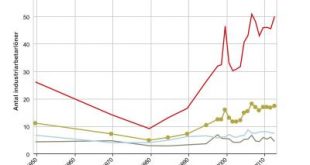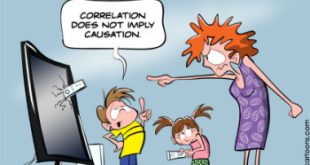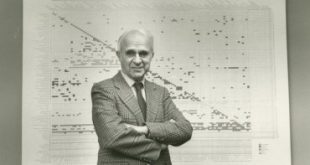Mainstream monetary theory — neat, plausible, and utterly wrong In modern times legal currencies are totally based on fiat. Currencies no longer have intrinsic value (as gold and silver). What gives them value is basically the legal status given to them by government and the simple fact that you have to pay your taxes with them. That also enables governments to run a kind of monopoly business where it never can run out of money. Hence spending becomes the...
Read More »Den blomstertid
[embedded content] div{float:left;margin-right:10px;} div.wpmrec2x div.u > div:nth-child(3n){margin-right:0px;} ]]> Advertisements
Read More »The American carnage
President Trump, in his inaugural address and elsewhere, rightly says that over the decades since 1980 American household distributions of income and wealth became strikingly unequal. But if recent budget and legislative proposals from Trump and the House of Representatives come into effect, today’s distributional mess would become visibly worse. I will sketch how the mess happened, then I will propose some ideas about how it might be cleaned up. I will show that even with...
Read More »Simpson’s paradox
[embedded content] From a more theoretical perspective, Simpson’s paradox importantly shows that causality can never be reduced to a question of statistics or probabilities, unless you are — miraculously — able to keep constant all other factors that influence the probability of the outcome studied. To understand causality we always have to relate it to a specific causal structure. Statistical correlations are never enough. No structure, no causality. Simpson’s paradox is an...
Read More »Logistic regression (student stuff)
Logistic regression (student stuff) [embedded content] And in the video below (in Swedish) yours truly shows how to perform a logit regression using Gretl:[embedded content] div{float:left;margin-right:10px;} div.wpmrec2x div.u > div:nth-child(3n){margin-right:0px;} ]]> Advertisements
Read More »Ekonomi och ojämlikhet
Förra hösten arrangerade Malmö högskola ett samtal om ekonomi och ojämlikhet i dagens Sverige. Under Cecilia Nebels kompetenta ledning samtalade serietecknaren Sara Granér, professor Tapio Salonen och yours truly om vad de växande inkomst- och förmögenhetsklyftorna gör med vårt samhälle. Ni som inte hade möjlighet vara där, kan följa samtalet här. div{float:left;margin-right:10px;} div.wpmrec2x div.u > div:nth-child(3n){margin-right:0px;} ]]> Advertisements...
Read More »Do you want to get a Nobel prize? Eat chocolate and move to Chicago!
Do you want to get a Nobel prize? Eat chocolate and move to Chicago! Source As we’ve noticed, again and again, correlation is not the same as causation … If you want to get the prize in economics — and want to be on the sure side — yours truly would suggest you complement your intake of chocolate with a move to Chicago. Out of the 78 laureates that have been awarded “The Sveriges Riksbank Prize in Economic Sciences in Memory of Alfred Nobel,” 28 have been...
Read More »Causality matters!
[embedded content] Causality in social sciences — and economics — can never solely be a question of statistical inference. Causality entails more than predictability, and to really in depth explain social phenomena require theory. Analysis of variation — the foundation of all econometrics — can never in itself reveal how these variations are brought about. First when we are able to tie actions, processes or structures to the statistical relations detected, can we say that we...
Read More »Hauptstadt Hamburg (personal)
Yours truly is heading (again) for Hamburg this summer, so of course I just had to buy this … div{float:left;margin-right:10px;} div.wpmrec2x div.u > div:nth-child(3n){margin-right:0px;} ]]> Advertisements
Read More »Leontief on the dismal state of economics
Leontief on the dismal state of economics Much of current academic teaching and research has been criticized for its lack of relevance, that is, of immediate practical impact … I submit that the consistently indifferent performance in practical applications is in fact a symptom of a fundamental imbalance in the present state of our discipline. The weak and all too slowly growing empirical foundation clearly cannot support the proliferating superstructure of...
Read More » Lars P. Syll
Lars P. Syll







